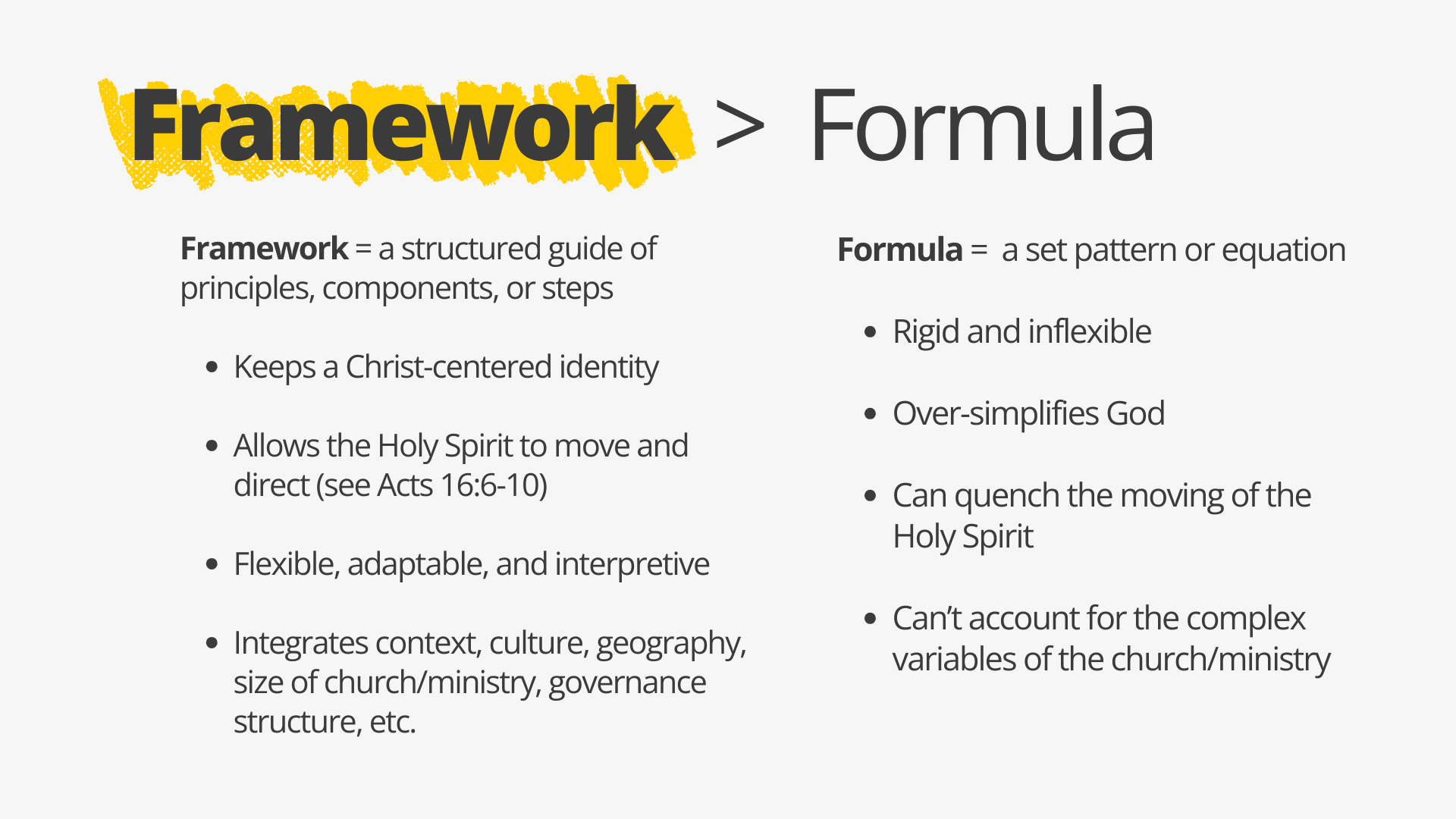Rooted in Scripture, Guided by the Spirit, Built for Your Context
The Church has been called to fulfill four primary functions:
Worship and Prayer (Matt. 21:13, Colossians 3:16)
Discipleship and Teaching (Matt. 28:20, Act 2:42)
Community and Connection (John 13:35, Galatians 6:2)
Missions and Evangelism (Matt 28:19, Acts 1:8).
And it’s also been tasked with fulfilling the greatest mission known to mankind.
Rather than prescribing a rigid formula for fulfilling the mission and ministry of the Church, Scripture shows Jesus and the Apostles using adaptable patterns and principles—a framework that grew the Church and spread the Gospel widely.
So why did God choose a framework over a formula?
Framework Benefits
Embracing this biblically grounded framework can lead to outcomes such as:
-
A framework ensures the church/ministry is focused on fulfilling its primary functions and building God’s kingdom with urgency, aligning everyone with the mission. (Matt. 28:19-20, Luke 10:2)
-
Provides clear discipleship pathways, clarifies who you are reaching and how to help them get involved, and creates space for deep connection. (Matt. 28:19-20, Ephesians 4:11-12)
-
Facilitates spiritual development and depth of leaders, ministries, and the congregation as a whole—ensuring everyone has a “ministry mindset.” It also fosters opportunities for church planting or ministry multiplication. (Acts 6:7, Ephesians 4:11-12)
-
Transforms vision into actionable steps, helping grow ministries, target and train new leaders, and expand the mission while minimizing chaos, which creates long-term health and kingdom impact. (Proverbs 16:3, Acts 2:42-47)
-
Creates clear roles, responsibilities, and decision-making processes, promoting accountability and ensuring alignment within church/ministry leadership and overseer teams. (1 Cor. 12:4-5, Titus 1:7-9)
-
Establishes consistent rhythms for open, biblical conversations, fostering collaboration, conflict resolution, and preventing miscommunication.
-
Optimizes resources (talents, finances, time), ensuring they are used efficiently to fulfill God’s calling for your church/ministry. (Matt. 25:14-30, Luke 16:10-11)
-
Provides guardrails to keep the church/ministry focused on its core mission, preventing confusion, distractions, and disunity. (1 Cor. 1:10, Philippians 3:14)
The Framework Components
The framework is built around six components—Perspective, Team, Systems, Metrics, Barriers, and Momentum—all rooted in Scripture. Each component includes practical tools and disciplines designed to help you grow in clarity, health, and effectiveness.
Implementing the Framework
Every church and ministry has unique needs and resources, so there are a variety of opportunities for coaching and implementing the framework. If none of the formats below are the right fit, please contact me for other options, as I am more than happy to find a format that meets your needs.
3-Day Workshop*
Day 1*: Perspective
Day 2*: Teams, Systems, and Metrics
Day 3*: Barriers and Momentum
Also includes an individualized plan for implementation of the framework.
*Facilitated team discussions and time to work through the tools are provided each day
1-Day Workshop
Includes a full overview of all six components and an introduction to each tool. Also includes individualized plan for self-implementation of the framework.
Monthly Coaching
Includes discounted 3-Day Workshop as well as monthly check-in meetings to help you implement the framework. I will also attend and provide guidance at quarterly and annual momentum meetings.
Ad Hoc Coaching
This could include meeting with overseer team/board of directors, individual departments, succession/transition planning, budget planning, etc.




